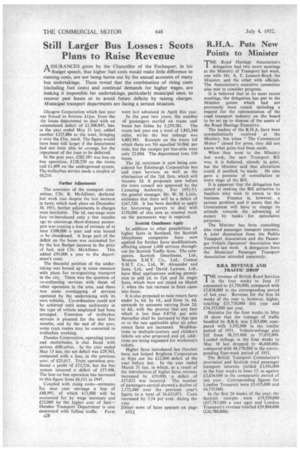Still Larger Bus Losses : Scots Plans to Raise Revenue
Page 30

If you've noticed an error in this article please click here to report it so we can fix it.
A SSURANCES given by the Chancellor of the Exchequer, in his " Budget speech, that higher fuel costs would make little difference to running costs, are not being borne out by the annual accounts of many bus undertakings. These reveal that the combination of rising costs (including fuel costs) and continual demands for higher wages, are making it impossible for undertakings, particularly municipal ones, to recover past losses or to avoid future deficits by raising charges. Municipal transport departments are facing a serious situation.
Glasgow Corporation which last year was forced to borrow aim. from the :7ity loans department to deal with an tccumulated deficit of £2,308,947, has, in the year ended May 31 last, added another £325.886 to the total, bringing It over the £3m. mark. The figure would have been still larger if the department had not been able to arrange for the repayment of the loan to be deferred.
In the.past year, £202,381 was lost on bus operation, £128,220 on the trams and £1,409 on the underground system. The trolleybus service made a surplus of £6,214.
Further Adjustments The convener of the transport committee, CUT. R. McAllister, declared last week mat despite the last increase in fares, which took place on December 30, 1951, further adjustments in charges were inevitable. The Id. one-stage tram fare re-introduced only a few months Igo to encourage short-distance passengers was causing a loss of revenue of at least £100,000 a year and was bound :o be abandoned, A large part of the deficit on the buses was accounted for by the last Budget increase in the price of fuel, said Car. McAllister, This added £95,000 a year to the department's costs.
The financial position of the undertaking was bound up in some measure with plans for re-organizing transport in the city. There was the question of co-ordinating services with those of other operators in the area, and there was some overlapping of services operated by the undertaking with its own vehicles. Co-ordination could not be achieved until some uniformity in the type of vehicle employed had been arranged. Extension of trolleybus services is planned for the next few months, and by the end of the year, some tram routes may be converted to trolleybus working.
Dundee Corporation, operating trams and motorbuses, is also faced with serious difficulties, In the year ended May 15 last, the net deficit was £29,763, compared with a loss, in the previous year. of £23,617. Tram operation produced a profit of £23,226, but the bus system incurred a deficit of £57,498. The loss on bus operation has increased to this figure from £6,111 in 1947.
Coupled with rising costs—estimates for next year envisage a loss of £68,995, of which £13,000 will be accounted for by wage 'increases and £22,000 by the higher cost of fuel— Dundee Transport Department is also
concerned with falling traffic. Fares A28
were last advanced in April this year. In the past two years, the number of passengers carried on trams and buses has fallen by 3,259,781. The trams last year ran a total of 1,842,246 mile& whilst the bus mileage was 4,883,991. Receipts on the trams (of which there are 56) equalled 34,06d. per mile, but the receipts per bus-mile were only 22.69d. The department runs 150 buses.
The 2d. minimum is now being considered for Edinburgh Corporation bus and tram 'services, as well as the elimination of the 24d. fare, which will become 3d. if proposals now before the town council are approved by the Licensing Authority. For 1952-53, the general manager. Mr. W. M. Little, estimates that there will be a deficit of £167,320. It has been decided to apply for borrowing powers to deal with £150,000 of this sum as renewal work on the permanent way is required.
Scottish Omnibuses Apply In addition to other possibilities of higher fares in Scotland, the Scottish Omnibuses companies have now applied for further fares modifications, affecting almost 1,600 services throughout the Scottish Traffic Area. The companies, Scottish Omnibuses, Ltd., Western S.M.T. Co., Ltd., Central S.M.T. Co„ Ltd., W. Alexander and Sons, Ltd.. and David Lawson, Ltd., have filed applications seeking permission to add id. to lid. and 2d. single fares, which were not raised on March 3, when the last increase in fares came into force.
It is also proposed to raise return fares under Is. 6d. by Id., and from is. 6d. upwards by amounts varying from 2d. to 4d., with the proviso that any fare which is less than 0.875d. per mile thereafter shall be increased to that rate or to the rate applicable after all other return fares are increased. Modifications to multiple-journey and childen's tickets are also proposed and id. additions are being requested for workmen's tickets.
Higher fares introduced last October have not helped Brighton Corporation to ivipe out the £22,000 deficit of the year before last. In the year ended March 31 last, in which, as a result of the introduction of higher fares, revenue increased by £19,000, a deficit of £17,012 was incurred. The number of passengers carried showed a decline of 2,172,440 over the previous year's figure, to a total of 34.433,071. Costs increased by 7.54 per cent. during the year.
[Other news of fares• appears on page 652.1
























































































